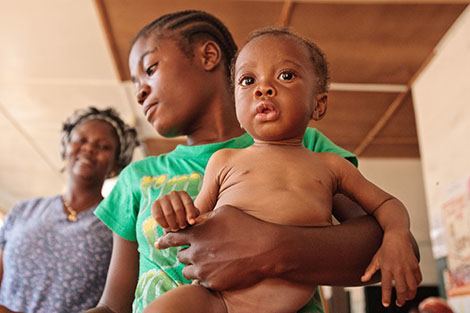For immediate release: Wednesday, February 3, 2016
Boston, MA – A new study suggests that the current recommendation to treat severely malnourished children with routine antibiotics does not increase the likelihood of nutritional recovery in uncomplicated cases. Given this finding, the study’s authors say that routinely using antibiotics may not be necessary or beneficial for severely malnourished children being treated at home when there is adequate local health infrastructure.
Reducing routine antibiotic use would be prudent given global concern over the problem of antibiotic resistance, say the researchers.
The study appears in the February 4, 2016 issue of the New England Journal of Medicine (NEJM).
The new findings challenge the World Health Organization’s (WHO) current guidelines that children with uncomplicated severe acute malnutrition (SAM) always be given antibiotics, whether or not they need them.
“Our results from Niger were surprising, as they challenge the current WHO recommendations and a recent well-conducted trial from Malawi. It’s an exciting step forward though, as we hope that this new evidence will motivate a deeper review of current recommendations and the evidence on which they are based,” said Sheila Isanaka, assistant professor of nutrition at Harvard T.H. Chan School of Public Health and lead author of the study.
SAM contributes to high child mortality in many places throughout the world, affecting about 34 million children under age 5. Bacterial infection can complicate advanced cases, so WHO recommended in 1999 that all children with SAM—all treated in hospitals at the time—be given antibiotics to reduce the risk of death. But recent developments in how SAM is treated have resulted in greater numbers of children diagnosed with SAM and more children treated at home before they’re seriously ill, instead of in the hospital. These changes have raised the question of whether it’s still necessary to routinely use antibiotics in all SAM cases treated at home.
For the new study, Isanaka—along with colleagues from Epicentre, Médecins sans Frontières (Doctors Without Borders), UNICEF, and the Ministry of Health of Niger, among others—looked at 2,399 children in rural Niger from ages 6-59 months who had uncomplicated SAM. They randomly assigned the children to receive either amoxicillin or a placebo for seven days.
They found that, among the children who received amoxicillin, 65.9% recovered, while 62.7% recovered in the placebo group—meaning that there was no significant difference in the likelihood of recovery between the groups.
The authors noted that forgoing routine use of antibiotics in settings with adequate medical infrastructure could simplify treatment protocols by eliminating the need for a health professional to prescribe the drugs. Instead, community health workers could oversee treatment—which would make it easier for more severely malnourished children to receive care, even in remote villages.
Harvard Chan School’s Nan Li, research scientist, also participated in the study.
The study was funded by Médecins sans Frontières—Operational Center Paris.
“Routine Amoxicillin for Uncomplicated Severe Acute Malnutrition in Children,” Sheila Isanaka, Céline Langendorf, Fatou Berthé, Smaila Gnegne, Nan Li, Nassirou Ousmane, Souley Harouna, Hamidine Hassane, Myrto Schaefer, Eric Adehossi, and Rebecca F. Grais, NEJM, online February 3, 2016, doi: 10.1056/NEJMoa1507024
Visit the Harvard Chan School website for the latest news, press releases, and multimedia offerings.
For more information:
Todd Datz
tdatz@hsph.harvard.edu
617.432.8413
###
Harvard T.H. Chan School of Public Health brings together dedicated experts from many disciplines to educate new generations of global health leaders and produce powerful ideas that improve the lives and health of people everywhere. As a community of leading scientists, educators, and students, we work together to take innovative ideas from the laboratory to people’s lives—not only making scientific breakthroughs, but also working to change individual behaviors, public policies, and health care practices. Each year, more than 400 faculty members at Harvard Chan School teach 1,000-plus full-time students from around the world and train thousands more through online and executive education courses. Founded in 1913 as the Harvard-MIT School of Health Officers, the School is recognized as America’s oldest professional training program in public health.
